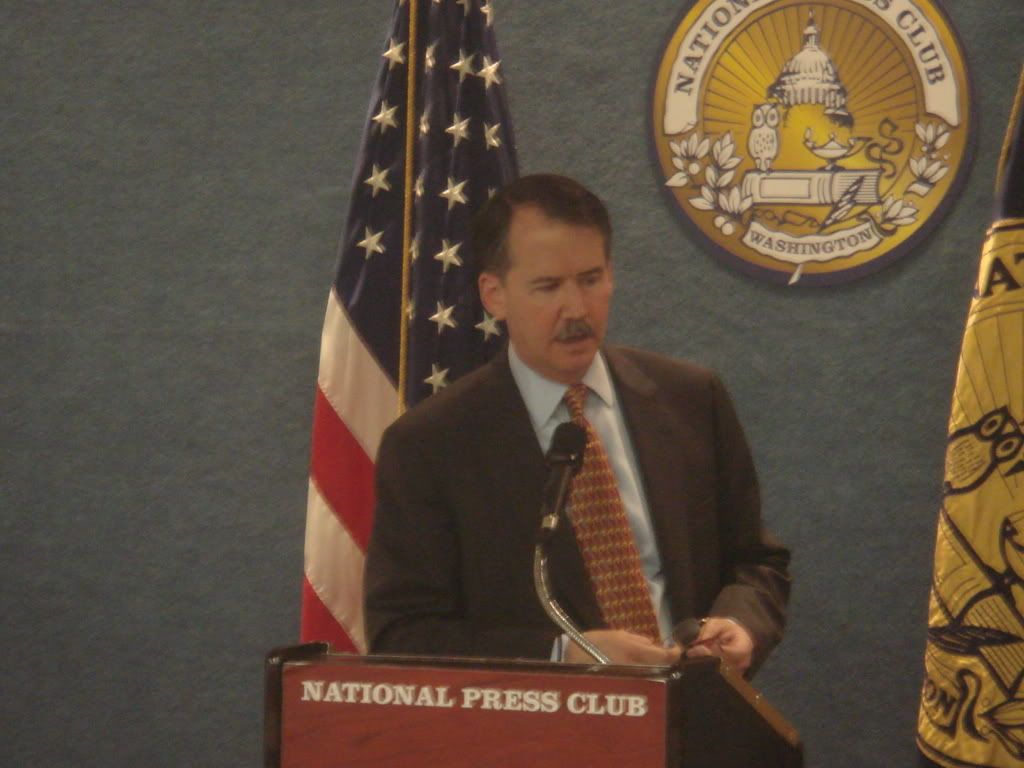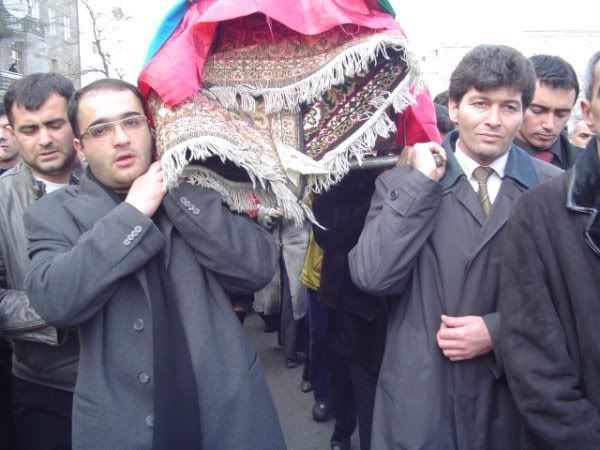From Washington, in Brief
By Emil Sanamyan
Amb. Evans sees Turkish government’s role in his forced retirement
 Pressure by Turkey may have played a role in his forced retirement, former U.S. Ambassador John M. Evans said at the National Press Club in Washington on April 24. Asked if he thought the Turkish government was involved, Mr. Evans said “I believe possibly so. I want to tell this story in my [upcoming] book. I do know that there were some telephone calls made.”
Pressure by Turkey may have played a role in his forced retirement, former U.S. Ambassador John M. Evans said at the National Press Club in Washington on April 24. Asked if he thought the Turkish government was involved, Mr. Evans said “I believe possibly so. I want to tell this story in my [upcoming] book. I do know that there were some telephone calls made.” Last September, in a letter to the Senate Foreign Relations Committee, the State Department admitted that three of its officials were contacted by Turkish lobbyists from the Livingston Group within days of Mr. Evans’ comments in February 2005.
Mr. Evans also mentioned that he “did not write the apology” that was issued in his name following the remarks. “It was dictated to me and it was posted on the web site,” he said. That statement described his remarks as “personal” and “improper.”
Asked if there was a written State Department directive not to use the word Genocide in the reference to the Armenian experience, Mr. Evans responded “I have never seen such a piece of paper. It is more an omission that it is a commandment. It is simply a kind of a taboo.”
In April 2005, Mr. Evans was selected for the American Foreign Service Association’s Constructive Dissent Award. “That announcement was made in a State Department telegram signed by [the Secretary of State Condoleezza] Rice,” he recalled. But in June 2005 Mr. Evans was summoned to Washington and “interrogated about the fact that [he] did not decline the award.” The award was ultimately withdrawn on a technicality.
Speaking in reference to the proposed House Resolution 106 (H. Res. 106), Evans said that “I do believe this Congress should pass [the Armenian Genocide] resolution.” He argued that unless there is political pressure on Turkey on this issue, the “natural default reaction” there will prevail and no substantial steps towards Armenian-Turkish normalization would be taken.
A book by Mr. Evans about his experience and views on ways to address the Armenian Genocide issue is currently with an editor and is expected to be released in spring 2008.
State Department flip-flops on controversial passage in Human Rights report
The latest annual State Department Report on Human Rights Practices, first released on March 6, caused controversy in Armenia because of a sentence that sounded like official lingo in its suggestion that Armenia “continues to occupy the Azerbaijani territory of Nagorno-Karabakh and seven surrounding Azerbaijani territories.”
The sentence was at odds with the carefully crafted U.S. policy language on Karabakh. While the U.S. recognizes Azerbaijan’s territorial integrity in principle (as it does that of Iraq, for example), U.S. officials typical clarify that “Karabakh’s status is a matter negotiations.”
The implication is that while the U.S. does not officially recognize Karabakh’s de-facto independence from Azerbaijan, it does not side in favor of Azerbaijan’s claim on Karabakh either.
Furthermore, every known peace proposal that U.S. mediators have helped draft in the last seven years would, if implemented, open the way to international recognition of Karabakh’s secession.
Foreign Minister Vartan Oskanian took issue with the report’s wording and Armenian officials have requested that State Department correct the language. According to Mr. Oskanian, U.S. officials said it was an “obvious mistake on their part” and promised to “try to make a correction in that document.” Such corrections are rare because of the bureaucratic hurdles involved.
Last week, the text was revised to say that “Armenian forces occupy large portions of Azerbaijan territory adjacent to Nagorno-Karabakh. Armenian officials maintain that they do not "occupy" Nagorno-Karabakh itself.”
While the revised version included a strange negation of the obvious (Iraqi Kurds are not accused of “occupying” Iraqi Kurdistan, for example), and the Azerbaijan portion of the report remained unedited (another bureaucratic hurdle), the change still “caused bewilderment” in Baku, which protested by calling off a previously planned official visit to Washington.
On April 26, State Department, apparently as a result of the Azeri protest, went back to the initial language. The Mediamax news agency cited Armenia’s Foreign Ministry spokesman as saying that the second change was a reflection of “frivolous attitude” to the report.
Asked by the Reporter to clarify the issue, State Department’s Deputy Spokesman Tom Casey admitted that his agency can be “fallible,” but stressed that “the bottom line here is that U.S. policy with respect to Karabakh is long-standing and it has not changed.”
Azerbaijan imprisons journalist for [allegedly] taking a moderate line on Karabakh
 The frequently persecuted Azerbaijani journalist Eynulla Fatullayev was sentenced to 2.5 years in prison on charges of “libel” on April 20, local and international news agencies reported. International organizations and media watchdogs criticized the move.
The frequently persecuted Azerbaijani journalist Eynulla Fatullayev was sentenced to 2.5 years in prison on charges of “libel” on April 20, local and international news agencies reported. International organizations and media watchdogs criticized the move.Mr. Fatullayev is the editor of the twice shut down “Realny Azerbaijan” and former deputy editor for even more frequently shut down “Monitor.” That publication finally closed after the March 2005 assassination of its chief editor Elmar Huseynov (who, Mr. Fatullayev believes, was killed with government’s involvement; perpetrators have not been found to date).
Unlike most of Azerbaijan’s media, Mr. Fatullayev, and the late Mr. Huseynov before him, allowed for relatively free discussion of issues related to the Karabakh conflict and refused to tow the government’s anti-Armenian hate-mongering. Mr. Fatullayev first earned nationalists’ ire after he visited Nagorno Karabakh in 2005, shortly before Mr. Huseynov’s murder.
The current “libel” charges arose from accusations that Mr. Fatullayev was “an Armenian agent of influence” who played down Azerbaijani civilian deaths during the Karabakh war, which he says he did not. In a sense, Mr. Fatullayev’s prosecution is similar to that of Hrant Dink, who was charged with writing what he did not and targeted for assassination as a result.
Turkish media soul-searching again, as Dink investigation appears stalled
Following the heinous murder of three Christians in the town of Malatya on April 18, the Turkish media is again full of introspective articles on the nature of nationalist violence in Turkey. The Turkish Daily News editor Yusuf Kanli wrote on April 20 that murders such as those in Malatya, that of Hrant Dink last January and others, continue to take place because “the real culprits,” those who organized the crimes are still “at large.”
Investigators have arrested 11 individuals in connection to Dink’s murder. The 11 are assorted nationalists from the Black Sea city of Trabzon and include the self-confessed assassin and the head of the local chapter of the nationalist Grand Unity Party. (For investigation details see February 24 Reporter). But none of the security officials believed to be involved have been legally sanctioned.
Asked by the Reporter on April 17, when organizers of the murder might be found, Chairman of the Turkish Parliament’s Foreign Relations Committee Mehmet Dulger produced a copy of a Turkish newspaper with a picture of crowds at Dink’s funeral and said that it showed how “Turkey is fed up with allegations concerning its behavior towards Armenians.” He said that “investigation is continuing and there may be some secrecy.”
Gul set to become Turkey’s President, French race still undecided
Turkey’s majority Justice and Development Party (AKP) selected Foreign Minister Abdullah Gul as their choice for Turkey’s next President, news media reported. Since presidents in Turkey are elected for a single seven-year term in a vote by Parliament (where AKP currently has a majority) Gul’s election is virtually assured. The nomination came about after AKP leader and Prime Minister Recep Tayyib Erdogan decided not to seek the presidency himself. The move is seen as a partial concession to the military-secular establishment, which has campaigned against Erdogan’s election. The formal parliamentary votes will be held in three rounds on May 2, 9 and 15.
In France, Nicolas Sarkozy from the ruling right-of center party and Socialist Segolene Royal advanced to the second round of elections on May 6. In the first round held on April 23, Sarkozy and Royal received 31 and 26 percent of the vote, respectively. Incidentally, both are supporters of the Armenian Genocide affirmation. Sarkozy, the current favorite, is also strongly opposed to Turkey’s membership in the European Union.

No comments:
Post a Comment